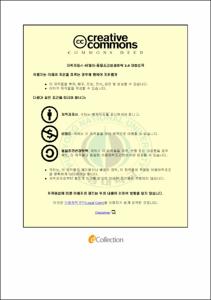유치원 교사의 사고양식과 교사효능감의 관계
- Alternative Title
- The Relationship Between Thinking Styles and Teacher Efficacy in Early Childhood Teachers
- Abstract
- Abstract
The purpose of this study is to explain the individual differences in teacher efficacy of Early Childhood teachers. For this, it has examined what are the thinking styles of teacher efficacy of Early Childhood teachers and examined the relationship between the thinking styles of Early Childhood teachers and the teacher efficacy.
For this purpose, the following research questions were wet.
First, is there a difference in the Early Childhood teacher's thinking pattern depending on her working institute, teaching experience, and class grades?
Second, is there a difference in the teacher efficacy of a Early Childhood teacher depending on her working institute, teaching experience, and class grades?
Third, how is the relationship between the thinking styles and the teacher efficacy of a Early Childhood teacher?
The research targets were 320 Early Childhood teachers in about 60 public and private kindergartens located in the B Metropolitan City. Among the 320 survey sheets, total of 299 sheets excluding undependable survey sheets were analyzed for data. For the research tool, Thinking Style Exam and the Teacher Efficacy Exam were used.
The translated version of "Thinking Styles Questionnaire Short Version" of Sternberg and Wagner (1994)" by Yoon, Misun (1997) was used for the questions in the Thinking Styles Survey Sheet. Each question has a rating scale from "not at all (1 point)" to "very much (5 points)." Among the 5 sub-categories of Thinking Styles Survey Sheet, it consisted of 65 questions by having 5 questions for each sub-category and total of 13 types of characteristics. For the Teacher Efficacy Survey Sheet, the Science Teacher Efficacy Exam Too developed by Enochs and Riggs (1990) after it was modified and adapted by Lee, Boonryeo (1998) as the general teacher efficacy exam tool and then remodified and properly tested by Kim, Soonnam (2000) to fit Korea's Early Childhood Education Status. The statistical technique used in the analysis are the Reliability Analysis, Basic Statistics and Frequency Analysis, T-test, One-way Analysis of Variance, Correlation Analysis, and Post Analysis.
The results from this study is as follows.
First, there is a difference in the Kindergarten Teacher Thinking Styles depending on their working institute, teaching experience, and class grades.
Compared to private kindergarten teachers, public kindergarten teachers prefer overall and internal-oriented thinking style. In other words, public kindergarten teachers tend to work independently by being interested in the overall aspect of the project. According to work experience, compared to kindergarten teachers with less than 3 years of experience, kindergarten teachers with more than 10 years of experience tend to have a higher monarchy, overall, and liberal thinking styles and the kindergarten teachers with less than 5 years of experience tends to have the hierarchy thinking style than kindergarten teachers with more than 10 years of experience. In other words, the more teaching experience the teacher has, they are able to see the Early Childhood Education from an overall point of view and we can expect them to push ahead in work by using various methods by focusing on one goal. Additionally, teachers with less than 5 years of work experience, they will tend to decide on the priority and importance of given tasks and it is expected that they will complete more work in a given time period. According to the grade level the teachers are responsible, compared to the 4 year old class teachers, the combined age group teachers showed a higher monarchy thinking style and the teachers of the combined age class tend to focus more on one task than the teachers of 4 year old classes.
Secondly, there was no significant difference in teacher efficacy depending on their working institute, teaching experience, and class grades.
Thirdly, there is a correlation between the kindergarten teacher's thinking style and the teacher efficacy.
The overall relationship between the thinking styles and the teacher efficacy of the kindergarten teachers was high in the overall teacher efficacy the higher legislative, executive, judicial, monarchy, overall, exterior, and free thinking styles the person has. The higher the hierarchy thinking style level among the categories, the overall teaching efficacy was lower. This can be interpreted as the kindergarten teacher's style preference is to focus on one thinking style and work by newly creating through cooperation with others in abstract work, the teacher efficacy is higher. On the other hand, the more the teacher tends to prefer the style of working in various tasks durin ga given period the teacher efficacy is lower.
- Issued Date
- 2012
- Awarded Date
- 2012. 2
- Type
- Dissertation
- Publisher
- 부경대학교 교육대학원
- Alternative Author(s)
- kim, jung mi
- Affiliation
- 부경대학교 교육대학원
- Department
- 교육대학원 유아교육전공
- Advisor
- 황희숙
- Table Of Contents
- 목 차
Ⅰ. 서론․․․․․․․․․․․․․․․․․․․․․․․․․․․․․․․․․․․․․․․․․․․․․․․․․․․․․․ 1
1. 연구의 필요성 및 목적 ․․․․․․․․․․․․․․․․․․․․․․․․․․ 1
2. 연구문제 ․․․․․․․․․․․․․․․․․․․․․․․․․․․․․․․․․․․․․․․․․․․․ 6
3. 용어의 정의 ․․․․․․․․․․․․․․․․․․․․․․․․․․․․․․․․․․․․․․․․ 7
Ⅱ. 이론적 배경․․․․․․․․․․․․․․․․․․․․․․․․․․․․․․․․․․․․․․․․․․․ 9
1. 사고양식․․․․․․․․․․․․․․․․․․․․․․․․․․․․․․․․․․․․․․․․․․․․․ 9
2. 교사효능감 ․․․․․․․․․․․․․․․․․․․․․․․․․․․․․․․․․․․․․․․․ 15
3. 유치원 교사의 사고양식과 교사효능감의
관계․․․․․․․․․․․․․․․․․․․․․․․․․․․․․․․․․․․․․․․․․․․․․․․․․․ 23
Ⅲ. 연구 방법․․․․․․․․․․․․․․․․․․․․․․․․․․․․․․․․․․․․․․․․․․․․․․ 26
1. 연구대상 ․․․․․․․․․․․․․․․․․․․․․․․․․․․․․․․․․․․․․․․․․․․․ 26
2. 연구도구 ․․․․․․․․․․․․․․․․․․․․․․․․․․․․․․․․․․․․․․․․․․․․ 28
3. 연구절차 ․․․․․․․․․․․․․․․․․․․․․․․․․․․․․․․․․․․․․․․․․․․․ 29
4. 자료분석 ․․․․․․․․․․․․․․․․․․․․․․․․․․․․․․․․․․․․․․․․․․․․ 30
Ⅳ. 연구 결과 ․․․․․․․․․․․․․․․․․․․․․․․․․․․․․․․․․․․․․․․․․․․․․ 31
1. 유치원 교사의 사고양식․․․․․․․․․․․․․․․․․․․․․․․․․ 31
2. 유치원 교사의 교사효능감․․․․․․․․․․․․․․․․․․․․․․ 37
3. 유치원 교사의 사고양식과 교사효능감의
관계․․․․․․․․․․․․․․․․․․․․․․․․․․․․․․․․․․․․․․․․․․․․․․․․․․․ 39
Ⅴ.논의 및 결론 ․․․․․․․․․․․․․․․․․․․․․․․․․․․․․․․․․․․․․․․․․ 42
1. 논의 ․․․․․․․․․․․․․․․․․․․․․․․․․․․․․․․․․․․․․․․․․․․․․․․․․ 42
2. 결론 및 제언 ․․․․․․․․․․․․․․․․․․․․․․․․․․․․․․․․․․․․․․․ 45
․․․․․․․․․․․․․․․․․․․․․․․․․․․․․․․․․․․․․․․․․․․ 48
․․․․․․․․․․․․․․․․․․․․․․․․․․․․․․․․․․․․․․․․․․․․․․․․ 54
- Degree
- Master
- Files in This Item:
-
-
Download
 유치원 교사의 사고양식과 교사효능감의 관계.pdf
기타 데이터 / 765.16 kB / Adobe PDF
유치원 교사의 사고양식과 교사효능감의 관계.pdf
기타 데이터 / 765.16 kB / Adobe PDF
-
Items in Repository are protected by copyright, with all rights reserved, unless otherwise indicated.